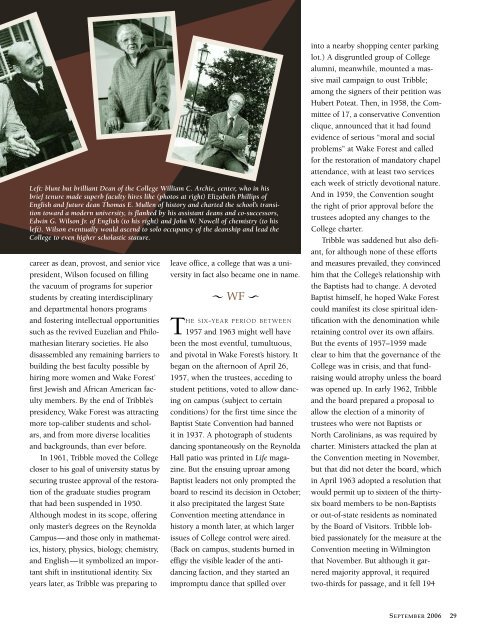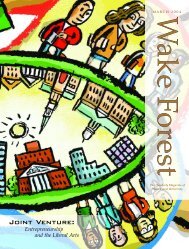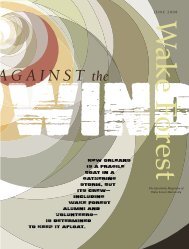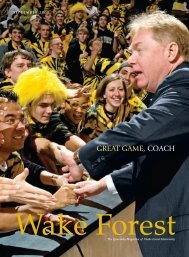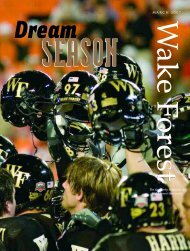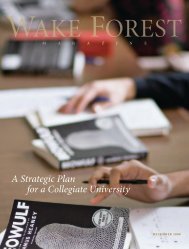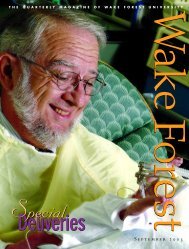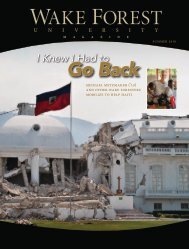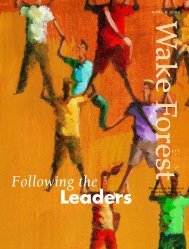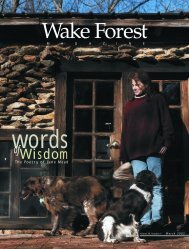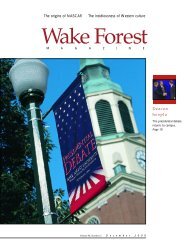Covers Contents - Past Issues - Wake Forest University
Covers Contents - Past Issues - Wake Forest University
Covers Contents - Past Issues - Wake Forest University
- No tags were found...
You also want an ePaper? Increase the reach of your titles
YUMPU automatically turns print PDFs into web optimized ePapers that Google loves.
Left: blunt but brilliant Dean of the College William C. Archie, center, who in hisbrief tenure made superb faculty hires like (photos at right) Elizabeth Phillips ofEnglish and future dean Thomas E. Mullen of history and charted the school’s transitiontoward a modern university, is flanked by his assistant deans and co-successors,Edwin G. Wilson Jr. of English (to his right) and John W. Nowell of chemistry (to hisleft). Wilson eventually would ascend to solo occupancy of the deanship and lead theCollege to even higher scholastic stature.career as dean, provost, and senior vicepresident, Wilson focused on fillingthe vacuum of programs for superiorstudents by creating interdisciplinaryand departmental honors programsand fostering intellectual opportunitiessuch as the revived Euzelian and Philomathesianliterary societies. He alsodisassembled any remaining barriers tobuilding the best faculty possible byhiring more women and <strong>Wake</strong> <strong>Forest</strong>’first Jewish and African American facultymembers. By the end of Tribble’spresidency, <strong>Wake</strong> <strong>Forest</strong> was attractingmore top-caliber students and scholars,and from more diverse localitiesand backgrounds, than ever before.In 1961, Tribble moved the Collegecloser to his goal of university status bysecuring trustee approval of the restorationof the graduate studies programthat had been suspended in 1950.Although modest in its scope, offeringonly master’s degrees on the ReynoldaCampus—and those only in mathematics,history, physics, biology, chemistry,and English—it symbolized an importantshift in institutional identity. Sixyears later, as Tribble was preparing toleave office, a college that was a universityin fact also became one in name.WFHE SIX-YEAR PERIOD BETWEENT1957 and 1963 might well havebeen the most eventful, tumultuous,and pivotal in <strong>Wake</strong> <strong>Forest</strong>’s history. Itbegan on the afternoon of April 26,1957, when the trustees, acceding tostudent petitions, voted to allow dancingon campus (subject to certainconditions) for the first time since theBaptist State Convention had bannedit in 1937. A photograph of studentsdancing spontaneously on the ReynoldaHall patio was printed in Life magazine.But the ensuing uproar amongBaptist leaders not only prompted theboard to rescind its decision in October;it also precipitated the largest StateConvention meeting attendance inhistory a month later, at which largerissues of College control were aired.(Back on campus, students burned ineffigy the visible leader of the antidancingfaction, and they started animpromptu dance that spilled overinto a nearby shopping center parkinglot.) A disgruntled group of Collegealumni, meanwhile, mounted a massivemail campaign to oust Tribble;among the signers of their petition wasHubert Poteat. Then, in 1958, the Committeeof 17, a conservative Conventionclique, announced that it had foundevidence of serious “moral and socialproblems” at <strong>Wake</strong> <strong>Forest</strong> and calledfor the restoration of mandatory chapelattendance, with at least two serviceseach week of strictly devotional nature.And in 1959, the Convention soughtthe right of prior approval before thetrustees adopted any changes to theCollege charter.Tribble was saddened but also defiant,for although none of these effortsand measures prevailed, they convincedhim that the College’s relationship withthe Baptists had to change. A devotedBaptist himself, he hoped <strong>Wake</strong> <strong>Forest</strong>could manifest its close spiritual identificationwith the denomination whileretaining control over its own affairs.But the events of 1957–1959 madeclear to him that the governance of theCollege was in crisis, and that fundraisingwould atrophy unless the boardwas opened up. In early 1962, Tribbleand the board prepared a proposal toallow the election of a minority oftrustees who were not Baptists orNorth Carolinians, as was required bycharter. Ministers attacked the plan atthe Convention meeting in November,but that did not deter the board, whichin April 1963 adopted a resolution thatwould permit up to sixteen of the thirtysixboard members to be non-Baptistsor out-of-state residents as nominatedby the Board of Visitors. Tribble lobbiedpassionately for the measure at theConvention meeting in Wilmingtonthat November. But although it garneredmajority approval, it requiredtwo-thirds for passage, and it fell 194SEPTEMBER 2006 29


